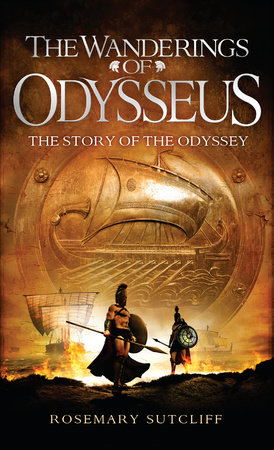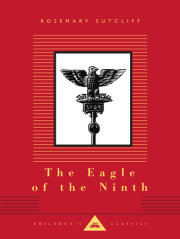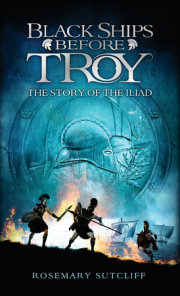The CYCLOPS
Seven more days at sea brought Odysseus and his fleet to an island of rough low hills, where a deep-set bay opened toward them; there in the mouth of the bay, they found a small and most beautiful islet that looked never to have felt the feet of any but the wild goats that grazed there. They beached their ships on the sheltered landward side, and passed the night feasting on fresh meat and the wine of Maron, priest of Apollo, thankful to rest from the sea whose waves pounded the outer side of the islet.
Next day, Odysseus took his own ship and a great jar of the priest's wine in case of need and, leaving all the rest, went to see what kind of people lived on the main island; for they could see the faint waft of distant fires, even hear faint and far off the bleating of sheep. And again, as with the Lotus Eaters, he wished to be sure whether or not the people were dangerous.
The crossing of the bay was quickly made, and Odysseus chose twelve men from his crew and pushed on inland. They had not gone far when they came upon a cave, its high entrance overhung with laurel bushes, and all about it large stone-walled folds such as men build to hold their flocks at night. Some of the folds were already filled with lambs and kids, but there was no sign of the grown flock, nor of the shepherd; so it must be that he had driven them out to pasture. Odysseus and his band prowled into the cave and looked about them. They found great baskets full of cheeses, huge pails brimming with milk and whey, but no sign or sound of life save for the bleating of the lambs from the folds outside.
The seamen wanted to take some cheeses and as many of the lambs and kids as they could carry and be off back to the ship. But Odysseus, always one for seeing whatever was to be seen, wanted to get a sight of the cave's owner before they left. So they ate some of the cheese, being hungry, and settled down at the back of the cave to wait.
Toward sunset a great bleating and pattering and all the sounds of a flock arose outside; a shadow fell across the entrance, and in came a monster shaped like a man but larger than any mortal, with only one eye, and that one round and hideous in the middle of his forehead. And at sight of him the Greeks knew that they had come to the land of Cyclops: one-eyed sons of Poseidon, the god of the sea, who lived in caves with their sheep and did not plant or sow, for wheat and vines grew wild for them. And the Greeks knew also that they were in deadly danger.
The giant flung down a huge bundle of dry wood that he had brought in for his evening fire. Then he drove in his ewes and with them the lambs and kids, leaving the rams penned outside, and, picking up a huge flat stone, set it across the cave mouth for a door. Twenty-two yoke of horses could not have dragged away that stone. Then he set himself to milking his ewes and she-goats, carefully putting her young to each mother as he finished. The milk he set aside in pails to be drunk or made into cheese.
And all this while, the Greeks sat very still in the deepmost inner end of the cave, cold-afraid and crouching in the dark.
But the darkness could not shield them for long, for the one-eyed giant was making his evening fire, and as the flames sprang up, the red light licked into the farthest corner of the cave and found them crouching there.
"Strangers!" roared the Cyclops when he saw them, in a voice like stones grating together on a beach. "What brings you here over the highways of the sea? Traders, are you? Or pirates sucking up other men's goods and gear?"
"We are Greeks," Odysseus told him, "men from the war-host of Agamemnon, who have been long years besieging Troy. Now, with Troy fallen, we are on our way back to our own land; but winds and tides have carried our ships into strange seas; and weare come to you, hoping in the name of Zeus the All-Father that you will show us the kindness and hospitality that men show to way-weary guests beneath their roof."
But in truth he expected little kindness in that place, and little enough kindness he and his men received.
"As to this Zeus whom you call the All-Father," said the giant, "we the Cyclops do not care an overripe fig for him, or for all his fellow gods save for Poseidon, who is our father, for we are stronger than they are, and have no need to obey any will but our own!" And he laughed deep in his throat and, seizing two of the crouching seamen, dashed out their brains on the ground. While their comrades watched in frozen horror, he tore them limb from limb and devoured them as a mountain liondevours his kill, washing down the flesh with long drafts of milk. Then he lay down to sleep amid the huddled warmth of his flock.
As soon as he was asleep, Odysseus drew his sword and, creeping close, felt for the place under the ribs where a sword thrust would pierce the giant's liver and let out his life. But even as he did so he remembered that with the Cyclops dead, there would be no getting out of that cave for himself or his men; not with that huge stone wedged across the entrance. And he sheathed his sword and went back and sat down among them once more, only shaking his head at their questioning looks.
Morning came, and the giant ate two more men. Then he milked and drove out his ewes, returning their young to the folds, and set the great stone back in the entrance as lightly as a man replacing the lid on a quiver full of arrows, and departed, driving his flock away to their day's grazing in the hill pastures.
The Greeks were near to despair. But there was a plan forming in Odysseus' head, bywhich he might save at least some of them.
The giant had left his staff in the cave; a tall trunk of olive wood still green, that looked to the captive Greeks more like the mast of a ship; and from this, with the tools that he found ready to hand, Odysseus managed to hack a piece about the length of an outstretched man. He set his men to smooth and shape it as though for a spear-shaft, while he built up the fire and got it blazing again. Then he took the olive-wood pole, and sharpened one end, and plunged it into the red heart of the fire to harden, pulling it out at the right moment and hiding it under the piled sheep's dung against the cave wall.
Back came the giant at sunset, and all happened again as the night before, save that this time, scenting danger in the air and thinking that they would be safer in the cave, he brought in his whole flock, rams and all. And well it was for the Greeks that he did so.
Odysseus and his band had brought a jar of Maron's wine with them when they came exploring; and during the day Odysseus had filled one of the Cyclops' ivy-wood bowls with it, adding no drop of water to the rich and heady drink. And when the giant had eaten his hideous evening meal, Odysseus took it to him humbly as a slave, saying, "This will be better than milk for washing down human flesh."
The giant drank, and smacked his lips over the goodness of it, and demanded another bowlful. Three times he drank and demanded more, and he grew very merry and swore that for such fine drink he would make the stranger a gift. "But first," he hiccuped, "you must tell me your name, that I may feel even more friendly toward you."
"My name is Nobody," said Odysseus, who knew this kind of game.
The giant let out a bellow of laughter. "Then I shall eat the rest of your company first, and Nobody last of all, and that shall be my gift to you." And, laughing still, he toppled over backward in wine-cup sleep, with his hair almost in the fringes of the fire.
Then Odysseus brought the sharpened stake from its hiding place and made the point hot in the fire, while the rest of his band--there were but six of them now--stood round ready and waiting. And when the point glowed clear red, they took it up and with all their strength drove it into the giant's one eye and rammed it home, and Odysseus twirled it as though it were some mighty timber drill. The huge eyeball hissed, like hot iron when men plunge it into cold water to temper it, and the giant struggled to his knees and then to his feet with a frightful shriek, tearing the still glowing stake from his blood-streaming eye socket, and howling for help to his fellow Cyclops who lived in caves nearby.
The giants came running, but checked outside the great entrance-stone, calling back, "Who is harming you, Polyphemus, that you wake us from our sleep with this uproar?"
And the giant Polyphemus roared back, "Nobody is harming me! Nobody is killing me by his cunning!"
"Then if nobody is harming you, you have no need of anyone to help you," shouted one of the giants. "If you are sick, pray to our father Poseidon, and maybe he will give you aid." Their grumbling voices grew fainter as they headed back to their own sleeping places. And the silent laughter stirred in Odysseus.
Wailing in agony, the blinded giant fumbled his way to the cave entrance and heaved the stone aside to get the night coolness on his wound; but he sat down in the opening, stretching out his arms on either side so that if any of his captives tried to get out, he could feel and catch them.
But Odysseus had a plan for that too. Working silently in the innermost part of the cave, he chose out the largest of the rams. And with long supple twigs drawn from the giant's sleeping place he bound them together in threes, with one of his men bound beneath the middle ram of each three, so that if the blind giant touched them he would feel only the outside rams. And the biggest and strongest ram of all he seized for himself, and clung to its underside by twisting his hands and feet in its thick belly fleece.
By the time Odysseus had finished, it was the edge of dawn, and the sheep and goats were moving toward the cave entrance, where Polyphemus sat with his arms outstretched. He felt each of them as they jostled past, but could not know of the men hidden under the bellies of his finest beasts.
The finest of all, burdened with Odysseus clinging under its belly, came last, and the giant fondled it, asking it sadly, "Dear ram, you who are so proud and beautiful and come always first among your fellows, why do you now come last ofall? Is it that you are slow with sorrow for your master, whom Nobody has blinded so that he cannot see your beauty anymore?"
But all of them were through at last. And out on the open turf beyond the folds, Odysseus cut free his men; and they drove the sheep down toward the ship waiting on the tideline, Polyphemus shouting and stumbling far behind them as they went.
The crew rejoiced at their coming, then wept for the death of six of their comrades. But there was no time for grieving, and Odysseus bade them load the sheep on board and push off for the islet where they had left the other ships. Then, seeing Polyphemus stumbling along the ragged clifftop, he cupped his hands about his mouth and bleated at him in mockery. That was not wise, for the sound gave their position away, and in fury the blind giant broke off the peak of a rocky hill and flung it after them. The rock fell just ahead of the ship and raised a wave that flung her back toward the shore; Odysseus shoved her off again with a stout pole, and his men bent to the oars, sending her leaping forward for open water. But Odysseus was still a little crazed with all that he had been through, and he shouted back, "If anyone asks who blinded you, tell them it was Odysseus, son of Laertes and Lord of Ithaca, Odysseus the Sacker of Cities!"
And Polyphemus flung up his arms and prayed in fury and agony to the Lord Poseidon, "Hear me, blue-haired Poseidon. If I am your son indeed, then grant me that Odysseus, Sacker of Cities, if ever he comes again to his home, comes late and alone. And when he lands from a stranger's ship, let him find black trouble waiting for him!"
And he heaved up another boulder, greater than the first, and hurled it in the direction of Odysseus' laughter. But this time it fell short and the wave that it made drove the ship forward on her way toward the islet where the rest of the fleet waited for them.
The LORD
of the WINDS
Their next landfall was the island of Aeolus, Lord of the Winds. Here, in a splendid palace walled with bronze and set above towering cliffs, Aeolus lived most happily with his six strong sons and six fair daughters, whom he had married to each other after the manner of the kings and queens of Egypt.
Aeolus received Odysseus and his company with great kindness and sheltered them beneath his roof for a full month, while Odysseus told him the story of the siege of Troy and his own homeward voyage so far. And when the time came for them to continue on their way, Aeolus gave them fresh supplies for the voyage. To Odysseus himself he gave a bag made from a single oxhide in which he had tied up all the winds of the world save one, a gentle west wind to carry them safe home. The bag was made fast with silver cords and stowed beneath the rowing benches of Odysseus' ship; and Aeolus bade them on no account to open it until they were safely tied up in their home harbor.
They sailed for nine days and nights never needing to touch the oars, with the west wind sweetly curving their sails; and during all that time Odysseus held his place at the steering-oar and would not trust it to anyone else. But on the tenth day they sighted Ithaca. Then Odysseus, worn out, and knowing by the familiar shape of his home hills lifting over the skyline that they were near the end of their seafaring, fell asleep. And while he slept, his crew, who had all along been filled with curiosity as to what was in the oxhide bag, began to talk among themselves.
Copyright © 2005 by Rosemary Sutcliff. All rights reserved. No part of this excerpt may be reproduced or reprinted without permission in writing from the publisher.





